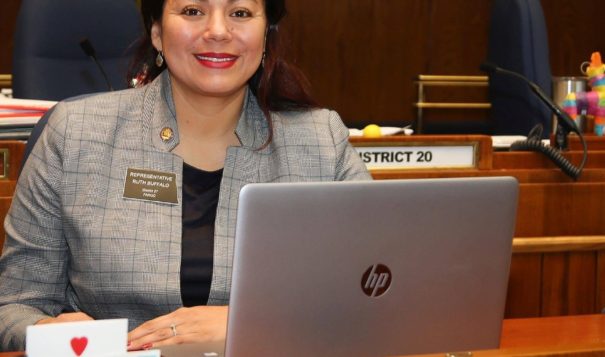News Article Article pages that do not meet specifications for other Trust Project Type of Work labels and also do not fit within the general news category.
Native lawmaker aims to revive North Dakota reconciliation bill
 Rep. Ruth Buffalo
Rep. Ruth Buffalo
BISMARCK, N.D. – Proposed North Dakota legislation to help heal the scars of racism and bigotry died an early death in a House of Representatives committee here on Feb. 9, but sponsor Ruth Buffalo is leading a charge to revive it in the near future.
“There are plans to move forward now. Community conversations were had today to move forward, regardless if this passes or not in the state Legislature,” she told Buffalo’s Fire on Feb. 11.
Chief among grassroots organizations getting involved in the effort is the Indigenous Community Circle, she said.
House Bill 1488 would have created a Truth, Healing and Reconciliation Commission to travel the state and gather testimonials from Native American communities about their struggles with the North Dakota state government.
“There are plans to move forward now. Community conversations were had today to move forward, regardless if this passes or not in the state Legislature.”
– Ruth Buffalo
The bill’s defeat was because the vote was “politicized,” Buffalo said in an interview. “We’re still encouraging people to contact their representatives,” she said, after sponsoring Sen. Richard Marcellais withdrew the bill after it was introduced on the house side.
The House Human Services Committee discarded the proposal with a 12-2 vote following Committee Chair Robin Weisz’ recommendation, which in turn came after North Dakota Indian Affairs Commission Executive Director Scott J. Davis told the committee that his state government office already is “doing truth and reconciliation” and claimed to have been excluded from plans for the bill.
“I’m well aware of the issues between our state and our tribes, I live and breathe that every day,” Davis told the committee. “I wish I was given a bit of a heads up on it, I probably could’ve given counsel and ideas.”
The proposal recalls the Truth and Reconciliation Commission of Canada that was active from 2008 to 2015. It was organized by the parties of the Indian Residential Schools Settlement Agreement to address the legacy of the schools’ “kill the Indian, save the man” approach, employed to force acculturation.
“I’m well aware of the issues between our state and our tribes, I live and breathe that every day. I wish I was given a bit of a heads up on it, I probably could’ve given counsel and ideas.”
– Director Scott J. Davis told the committee.
The commission revealed that history to many Canadians, and Buffalo believes it’s time to shine that same light in North Dakota. She said she thinks that a commission in the state is imperative to the healing process, though the focus need not be solely on the boarding schools.
The commission here would be laid out more holistically, undertaking field research on all kinds of intergenerational trauma faced by today’s Native communities.
It would “examine and investigate records; receive testimony and provide a forum for indigenous victims and families to discuss the personal impacts of physical, psychological, and spiritual violence; and document the adversarial historical relationship between the state and North Dakota Native Americans to clarify the historical record of the state-tribal relationship, in the spirit of truth, healing, and reconciliation,” the bill sets forth.
An advisory council consisting of tribal representatives, a member of the state’s historical society, and “one neutral member, preferably a tribal elder,” would receive applications and determine tribal members’ appointments to the five-person commission, according to the proposals’ provisions.
Its language called for putting the commission in play from 2021 until August 2025, and every year provide a peace summit at the International Peace Garden to foster understanding for the benefit of future generations.
Christian Hustad is an Assiniboine tribal citizen and content creator. Contact him at cjhustad.94(at)gmail.com.
